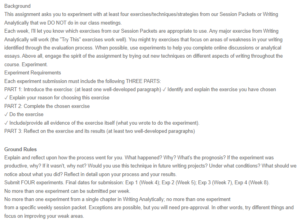Writing Experiments – Writing Analytically
Part One: The Exercise
I chose the exercise from Chapter 1 of Writing Analytically, ‘Try This 1.1: Experiment with Adjectives and Adverbs.’ In the exercise, I had to create a description paragraph without using judgmental adjectives or adverbs. The exercise focuses on overusing subjective language and relying too heavily on evaluative phrases while expressing ideas in writing. I chose this activity because it enables me to assess and categorize adjectives and adverbs in a recent piece of my writing, such as a book review or an editorial, to pinpoint where I can sharpen my objective and analytical approach. It also helps me create a more critical and precise writing style.
Do you need help in your assignment ? Our team are experts at writing.
Part 2: Exercise Completion
Let’s take the example of describing a serene beach scene: “The golden sand stretches along the shore, gently caressed by the lapping waves. The sun sets on the horizon, painting the sky with a warm palette of colours. Seagulls soar gracefully above, their calls echoing in the distance. A light breeze rustles the palm leaves, creating a soothing melody. People walk leisurely by the water, their laughter and chatter mingling with the natural sounds of the beach.” One must refrain from using evaluative adjectives and adverbs to convey the specifics of the beach scene objectively and let readers create their own opinions based on the given facts (Jędrzejowski & Umbach, 2023).
Part 3: Exercise Reflection
Writing a paragraph without using evaluative adjectives and adverbs was challenging and instructive. I first struggled to refrain from utilizing subjective language because of how frequently evaluative words appear in my writing. To properly communicate the picture, I eventually became more aware of the words I used and concentrated on using specifics and sensory descriptions. This exercise was productive because it taught me the value of precise details and helped me eliminate pointless subjectivity, which helped me develop my analytical writing abilities. The clarity and persuasiveness of my writing are improved by writing objectively and analytically, making it more accessible to a broader audience.
I would use this technique in future learning projects to strengthen my writing. However, I would apply it under appropriate conditions, such as when I need to present unbiased information, conduct research, or provide descriptive analysis. From the exercise, you should notice that I focused on writing a descriptive paragraph without using evaluative adjectives and adverbs, which is shown in word choices and emphasis on concrete details. The process was challenging initially as I had to break the habit of relying on subjective language, but it led to a more objective and precise writing style, as shown in the result in part two, allowing readers to form their own interpretations based on the provided information rather than being influenced by my opinions.
References
Rosenwasser, D., & Stephen, J. (2018). Writing Analytically (8th ed). Cengage Learning.
Jędrzejowski, Ł., & Umbach, C. (2023). Non-Interrogative Subordinate Wh-Clauses. Oxford University Press.
ORDER A PLAGIARISM-FREE PAPER HERE
We’ll write everything from scratch
Question

Writing Experiments – Writing Analytically
Background
This assignment asks you to experiment with at least four exercises/techniques/strategies from our Session Packets or Writing Analytically that we DO NOT do in our class meetings.
Each week, I’ll let you know which exercises from our Session Packets are appropriate to use. Any major exercise from Writing Analytically will work (the “Try This” exercises work well). You might try exercises that focus on areas of weakness in your writing identified through the evaluation process. When possible, use experiments to help you complete online discussions or analytical essays. Above all, engage the spirit of the assignment by trying out new techniques on different aspects of writing throughout the course. Experiment.
Experiment Requirements
Each experiment submission must include the following THREE PARTS:
PART 1: Introduce the exercise: (at least one well-developed paragraph) ✓ Identify and explain the exercise you have chosen
✓ Explain your reason for choosing this exercise
PART 2: Complete the chosen exercise
✓ Do the exercise
✓ Include/provide all evidence of the exercise itself (what you wrote to do the experiment).
PART 3: Reflect on the exercise and its results (at least two well-developed paragraphs)
Ground Rules
Explain and reflect upon how the process went for you. What happened? Why? What’s the prognosis? If the experiment was productive, why? If it wasn’t, why not? Would you use this technique in future writing projects? Under what conditions? What should we notice about what you did? Reflect in detail upon your process and your results.
Submit FOUR experiments. Final dates for submission: Exp 1 (Week 4); Exp 2 (Week 5); Exp 3 (Week 7), Exp 4 (Week 8).
No more than one experiment can be submitted per week.
No more than one experiment from a single chapter in Writing Analytically; no more than one experiment
from a specific weekly session packet. Exceptions are possible, but you will need pre-approval. In other words, try different things and focus on improving your weak areas.


